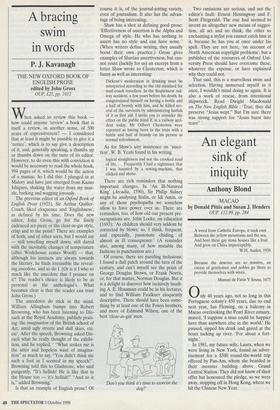A bracing swim in words
P. J. Kavanagh
THE NEW OXFORD BOOK OF ENGLISH PROSE edited by John Gross OUP, £25, pp. 1012 hen asked to review this book how could anyone 'review' a book that is itself a review, in another sense, of 500 years of expressiveness? — I considered that at least it might be possible to give it a `notice', which is to say give a description of it, and, generally speaking, a thumbs up or thumbs down on the taste of its editor. However, to do even this with conviction it would be necessary to read the whole book, 994 pages of it, which would be the action of a maniac. So I did this: I plunged in at Malory and have just emerged from Kazuo Ishiguro, shaking the water from my muz- zle, barking and wagging joyously.
The previous editor of an Oxford Book of English Prose (1925), Sir Arthur Quiller- Couch, liked eloquence and 'Englishness', as defined by his time. Does the new editor, John Gross, go for the finely cadenced set-piece or the clear-as-gin style, crisp and to the point? There are examples of both, and of other sorts, but I would say — still towelling myself down, still dazed with the inevitable changes of temperature (after Wodehouse comes Woolf) — that, although his instincts are always towards the literary, he finds irresistible the reveal- ing anecdote, and so do I. (Or is it I who so much like the anecdote that I pounce on it? The reader's choice is likely to be as personal as the anthologist's. What becomes clear is that the reader can trust John Gross.) The anecdotes do stick in the mind. William Allingham bumps into Robert Browning, who has been listening to Dis- raeli at the Royal Academy, publicly prais- ing 'the imagination of the British school of Art, amid ugly streets and dull skies, etc. etc'. After the speech, Browning asked Dis- raeli what he really thought of the exhibi- tion, and he replied, ' "What strikes me is the utter and hopeless want of imagina- tion" as much to say, "You didn't think me such a fool as I seemed in my speech!". Browning told this to Gladstone, who said pungently, "It's hellish! He is like that in the House too — it's hellish!" "And so it is," added Browning.'
Is that an example of English prose? Of course it is, of the journal-jotting variety, even of journalism. It also has the advan- tage of being interesting.
Shaw has a shot at defining good prose: `Effectiveness of assertion is the Alpha and Omega of style. He who has nothing to assert has no style and can have none. ' (When writers define writing, they usually boost their own practice.) Gross gives examples of Shavian assertiveness, but can- not resist (luckily for us) an excerpt from a letter Shaw wrote to Chesterton, which is funny as well as interesting: Dickens's moderation in drinking must be interpreted according to the old standard for mail-coach travellers. In the Staplehurst rail- way accident, a few years before his death, he congratulated himself on having a bottle and a half of brandy with him, and he killed sev- eral of the survivors by administering hatfuls of it as first aid. I invite you to consider the effect on the public mind if, in a railway acci- dent today, Mr Gilbert Chesterton were reported as having been in the train with a bottle and half of brandy on his person as normal refreshment.
As for Shaw's airy insistence on 'asser- tion',.W. B. Yeats found in his writing logical straightness and not the crooked road of life. . . Frequently I had a nightmare that I was haunted by a sewing-machine, that clicked and shone.
There are rich reminders that nothing important changes. In 'An Ill-Natured King' (Arcadia, 1590), Sir Philip Sidney might be analysing Stalin, or Idi Amin, or any of those psychopaths we somehow allow to have power over us. There are reminders, too, of how old our present pre- occupations are. John Locke, on education (1693): 'As children should very seldom be corrected by blows; so, I think, frequent, and especially, passionate chiding, of almost as ill consequence.' (A reminder also, among many, of how mutable the fashions in punctuation are.) Of course, there are puzzling inclusions; I found a dull patch around the turn of the century, and can't myself see the point of George Douglas Brown, or Frank Norris, or, for that matter, Norman Douglas. But it is a delight to discover how incisively insult- ing A. E. Housman could be in his lectures, and to find William Faulkner eloquently descriptive. There should have been some- thing by at least one of the Powys brothers, and more of Edmund Wilson, one of the best 'clear-as-gin' men.
Don't you think it's time to exorcise the dog?' Two omissions are serious, and not the editor's fault: Ernest Hemingway and F. Scott Fitzgerald. The one had seemed to invent an altogether new means of sugges- tion, all act and no think; the other so enchanting a stylist you cannot catch him at it, because he has you at once under his spell. They are not here, 'on account of North American copyright problems', but a publisher of the resources of Oxford Uni- versity Press should have overcome these, whatever the expense, or have explained why they could not.
That said, this is a marvellous swim and selection. Having immersed myself in it once, I wouldn't mind doing so again. It is also a work of rescue, from intentional shipwreck. Read Dwight Macdonald on The New English Bible : 'True, they did preserve "Jesus wept." But I'm sure there was strong support for "Jesus burst into tears" '.










































































 Previous page
Previous page